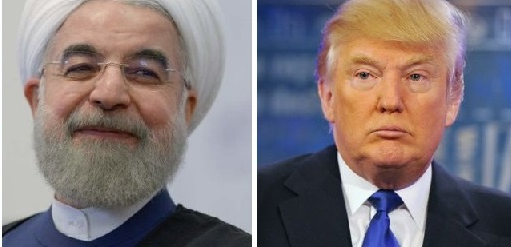It could be to Tehran’s perceived advantage to ostentatiously drag Israel into any US- or Iran-initiated war. Striking the US homeland would be vastly more difficult for Iran, and would also be more likely to elicit intolerable reprisals.
Louis René Beres
For by wise counsel thou shalt make thy war. Proverbs 24:6
On core matters of peace and security, two closely interrelated questions must be asked:
1. What precisely does Donald Trump have in mind regarding any potential armed conflict with Iran?
2. What might such a possibility portend for Israel, a US ally?
Answers to these questions must extend beyond narrowly partisan simplifications. They should be nuanced and subtly overlapping.
At a minimum, once a shooting war were underway, the Israeli armed forces (IDF) could become involved, possibly to a substantial degree. In a worst case scenario, clashes would involve unconventional weapons and directly affect Israel’s civilian population. The worst of the worst could involve nuclear ordnance.
During the period when Israel remains the only regional nuclear power, an American war with Iran could elicit Israeli threats of nuclear deterrence and/or Israeli nuclear reprisals for harm inflicted upon it by the enemy.
For Israel, such threats or reprisals could be entirely rational. How might such a dangerous situation develop? As a “bolt-from-theblue” spasm of violence? In difficult to fathom increments? Most credibly, perhaps, a “collateral war” would come to Israel as a catastrophic fait
accompli, a multi-pronged belligerency that renders even the most comprehensive security preparations in Jerusalem inadequate.
What would happen then?
The only meaningful answer to such a question must be a candid affirmation of strategic unpredictability. In science and mathematics,
statements of probability must be drawn systematically from relevant past events. The challenge lies in the fact that in the strategic matters currently facing America and Israel, there are no relevant past events.
There is more strategy to ponder. As of this writing, Donald Trump has not revealed a military doctrine. Accordingly, if confronted with a “no doctrine” war launched against Iran by this American president, whether as a defensive first strike or a retaliation, Israel’s senior strategists would need to fashion their corresponding doctrines ex nihilo. Inevitably, they would have to proceed without the benefit of historical information.
How should Jerusalem attempt to anticipate Iranian or Iranian-proxy attacks on Israeli targets? As an antecedent question, how should Israeli decision-makers and planners best identify which of these vulnerable targets should be judged “high value?”
In 1991 and 2014, Israel’s ultrasensitive nuclear facility at Dimona came under rocket and missile attack from Iraqi and Hamas aggressions, respectively.
In a war with the US, Tehran would likely regard direct attacks upon selected Israeli targets as proper “retaliations” for American strikes –
whether or not those strikes were in response to an Iranian initiation of hostilities. Iranian forces could potentially gain operational access
to hypersonic rockets or missiles, and Israel’s capacity to shoot down hypersonic glide vehicles (HGVs) and/or hypersonic cruise missiles
(HCMs) might prove inadequate.
What Happens to Israel If the US and Iran Go to War? Then what?
It could be to Tehran’s perceived advantage to ostentatiously drag Israel into any US- or Iran-initiated war. Striking the US homeland would be vastly more difficult for Iran, and would also be more likely to elicit intolerable reprisals. Wittingly or unwittingly, a Trump-initiated war
against Iran would strengthen Saudi military power specifically and Sunni Arab military power in general. While such a strengthening might
seem less ominous for Israel than further Iranian militarization, that delicate strategic calculus could change very quickly.
Should the Trump-led US military find itself in a two-front or multifront war – a complex conflict wherein American forces were battling in
Asia (North Korea) and the Middle East simultaneously – Israel could unexpectedly find itself fighting on its own. In such a scenario, Israeli
strategists would need to bear in mind that the whole of any deterioration caused by multi-front engagements could effectively exceed the sum of its constituent parts.
This means, among other things, that Israeli strategists and planners would need to remain sensitive to all conceivable synergies. In this connection, it goes without saying that the Trump administration is unaccustomed to such calculations.
For Carl von Clausewitz, the author of On War, the determining standard of reasonableness in any military contest must always lie in its presumed political outcomes. For a state to get caught up in a war – any war – without clear political expectations is always a mistake.
For more years than we may care to recollect, futile American wars have been underway in Iraq and Afghanistan. In time, for both Iraqis and
Afghans, once-hoped-for oases of regional stability will regress to what seventeenth-century English philosopher Thomas Hobbes called a “war of all against all.” At best, what eventually unravels in these severely fractured countries will be no worse than if these wars had never even been fought.
This is not a desired political outcome.
Shouldn’t we now inquire, accordingly: Should Americans sacrifice so much blood and treasure to bring about a status quo ante bellum?
Over the years, with the exception of North Korea, America’s principal doctrinal enemy has changed from “communism” to “Islamism” or
“jihadism.” This time, the ideological adversary is real and not merely presumptive. It is a formidable and foe, one that requires serious analytic study – not ad hoc responses or seat-of-the-pants presidential eruptions.
At times, real or contrived bellicosity can serve American national security policy objectives, but not where it is wholly detached from any
previously constructed theoretical foundations.
The jihadist enemy of Israel and America can never be fully defeated. To wit, it will not be immobilized on traditional military battlefields.
If at some point a jihadist adversary has seemingly been vanquished by US military forces in one country or another, it will likely regroup elsewhere.
After Iraq, after Afghanistan, even after Syria (which is now winding down with US and Russian support of a genocidal regime that has been
historically hostile to Israel), America will face resurgent adversaries in hard-to-manage and geographically far-flung places. These locales
include Sudan, Mali, Nigeria, Yemen, Somalia, Egypt, and perhaps even Bangladesh or (in the future) “Palestine.”
The American president and his National Security Advisor sound daily alarm bells about Iran – and this after the US, not Iran, withdrew
from an international legal agreement that was less than perfect, but better than nothing.
When all these intersecting factors are taken into account, there remains a residual argument (one that might be anticipated in Israel) that a
US-generated war with Iran would amount to a de facto anti-nuclear preemption or some similarly purposeful act of “anticipatory selfdefense.” In that case, the American war would be widely regarded in Jerusalem as cost-effective or a net gain. This assessment could,
however, be more wish fulfillment than a serious strategic assessment of risks and benefits.
It would be extremely difficult for the US to target its bombs and missiles effectively against the widely dispersed and hardened Iranian nuclear infrastructure. A US war against Iran would thus be contrary to Israel’s core national security interests and obligations. Glib reassurances to the contrary from Jerusalem or Washington could be lethal for Israel.
The threat from Iran should never be taken as an opportunity for simplifying political rhetoric. Instead, this threat should be assessed and
calibrated dialectically, as reliably as possible according to normally verifiable standards of enemy force posture estimations.
If, at any point during crisis bargaining between Iran, Hezbollah, Israel, and the US, one side or the other places too great a value on achieving “escalation dominance” and too little on considerations of national safety, the conflict could spin out of control. Such a deterioration would be especially worrisome if Israel threatened or actually launched some of its presumptive nuclear forces. This is the case, moreover, irrespective of any promised strategic support for Israel from the US.
In sum: if Israel should look to the US for seamlessly capable geostrategic leadership (especially now), it would be taking very great and indeed unprecedented national security risks. At a minimum, Israel has the incontestable right (and also the obligation to its own citizens) to expect fully decipherable expressions of US military doctrine. Unless it insists more firmly upon maintaining this critical right, Israel could be forced to face starkly injurious security outcomes that could prove irremediable and irreversible.
For both Israel and the US, it is time for caution. All Iran-centered quandaries are turbulent and uncharted waters. In principle, perhaps,
they can be successfully navigated, but only after abundant applications of both intellect and perspicacity.
Louis René Beres was educated at Princeton (Ph.D., 1971), and is Emeritus Professor of International Law at Purdue. His twelfth book, Surviving Amid Chaos: Israel’s Nuclear Strategy, was published in 2016. His other writings have been published in Harvard National Security Journal; Yale Global Online; World Politics (Princeton); Bulletin of the Atomic Scientists; Israel Defense; Parameters: Journal of the US Army War College; Special Warfare; Oxford University Press; The Jerusalem Post; Infinity Journal; BESA Perspectives; US News & World Report; The Hill; and The Atlantic.
His Terrorism and Global Security: The Nuclear Threat (Westview, first edition, 1979) was one of the first scholarly books to deal specifically with nuclear
This article was first published in Mideast Security and Policy Studies No. 165
Read more about: Israel-Iran-Syria, Middle East, US-Iran




